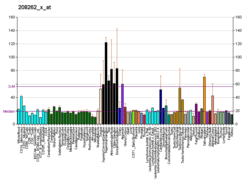MEFV
MEFV (Mediterranean fever) is a human gene that provides instructions for making a protein called pyrin (also known as marenostrin). Pyrin is produced in certain white blood cells (neutrophils, eosinophils and monocytes) that play a role in inflammation and in fighting infection. Inside these white blood cells, pyrin is found with the cytoskeleton, the structural framework that helps to define the shape, size, and movement of a cell. Pyrin's protein structure also allows it to interact with other molecules involved in fighting infection and in the inflammatory response.
Although pyrin's function is not fully understood, it likely assists in keeping the inflammation process under control. Research indicates that pyrin helps regulate inflammation by interacting with the cytoskeleton. Pyrin may direct the migration of white blood cells to sites of inflammation and stop or slow the inflammatory response when it is no longer needed.
The MEFV gene is located on the short (p) arm of chromosome 16 at position 13.3, from base pair 3,292,027 to 3,306,626.[5]
Related conditions
More than 80 MEFV mutations that cause familial Mediterranean fever have been identified. A few mutations delete small amounts of DNA from the MEFV gene, which can lead to an abnormally small protein. Most MEFV mutations, however, change one of the protein building blocks (amino acids) used to make pyrin. The most common mutation replaces the amino acid methionine with the amino acid valine at protein position 694 (written as Met694Val or M694V). Among people with familial Mediterranean fever, this particular mutation is also associated with an increased risk of developing amyloidosis, a complication in which abnormal protein deposits can lead to kidney failure. Some evidence suggests that another gene, called SAA1, can further modify the risk of developing amyloidosis among people with the M694V mutation.
MEFV mutations lead to reduced amounts of pyrin or a malformed pyrin protein that cannot function properly. As a result, pyrin cannot perform its presumed role in controlling inflammation, leading to an inappropriate or prolonged inflammatory response. Fever and inflammation in the abdomen, chest, joints, or skin are signs of familial Mediterranean fever.
See also
References
- GRCh38: Ensembl release 89: ENSG00000103313 - Ensembl, May 2017
- GRCm38: Ensembl release 89: ENSMUSG00000022534 - Ensembl, May 2017
- "Human PubMed Reference:". National Center for Biotechnology Information, U.S. National Library of Medicine.
- "Mouse PubMed Reference:". National Center for Biotechnology Information, U.S. National Library of Medicine.
- "MEFV - Mediterranean fever". US National Library of Medicine, National Institutes of Health, Department of Health & Human Services. 2011-04-07. Retrieved 2011-04-14.
- Dogan H, Akdemir F, Tasdemir S, Atis O, Diyarbakir E, Yildirim R, Emet M, Ikbal M (2014). "A novel insertion mutation identified in exon 10 of the MEFV gene associated with Familial Mediterranean Fever". BMC Medical Genetics. 15 (1): 74. doi:10.1186/1471-2350-15-74. PMC 4094690. PMID 24980720.
Further reading
- Bakkaloglu A (Sep 2003). "Familial Mediterranean fever". Pediatric Nephrology. 18 (9): 853–9. doi:10.1007/s00467-003-1185-2. PMID 12836090.
- Delibaş A, Oner A, Balci B, Demircin G, Bulbul M, Bek K, Erdoğan O, Baysun S, Yilmaz E (2005). "Genetic risk factors of amyloidogenesis in familial Mediterranean fever". American Journal of Nephrology. 25 (5): 434–40. doi:10.1159/000087824. PMID 16118480.
- Gershoni-Baruch R, Brik R, Zacks N, Shinawi M, Lidar M, Livneh A (Apr 2003). "The contribution of genotypes at the MEFV and SAA1 loci to amyloidosis and disease severity in patients with familial Mediterranean fever". Arthritis and Rheumatism. 48 (4): 1149–55. doi:10.1002/art.10944. PMID 12687559.
- Mansfield E, Chae JJ, Komarow HD, Brotz TM, Frucht DM, Aksentijevich I, Kastner DL (Aug 2001). "The familial Mediterranean fever protein, pyrin, associates with microtubules and colocalizes with actin filaments". Blood. 98 (3): 851–9. doi:10.1182/blood.V98.3.851. PMID 11468188.
- Medlej-Hashim M, Delague V, Chouery E, Salem N, Rawashdeh M, Lefranc G, Loiselet J, Mégarbané A (Feb 2004). "Amyloidosis in familial Mediterranean fever patients: correlation with MEFV genotype and SAA1 and MICA polymorphisms effects". BMC Medical Genetics. 5: 4. doi:10.1186/1471-2350-5-4. PMC 356915. PMID 15018633.
- Notarnicola C, Didelot MN, Koné-Paut I, Seguret F, Demaille J, Touitou I (Oct 2002). "Reduced MEFV messenger RNA expression in patients with familial Mediterranean fever". Arthritis and Rheumatism. 46 (10): 2785–93. doi:10.1002/art.10575. PMID 12384939.
- Telatar M, Grody WW (2000). "Molecular genetic testing for familial Mediterranean fever". Molecular Genetics and Metabolism. 71 (1–2): 256–60. doi:10.1006/mgme.2000.3047. PMID 11001819.
- Ustek D, Ekmekci CG, Selçukbiricik F, Cakiris A, Oku B, Vural B, Yanar H, Taviloglu K, Ozbek U, Gül A (Jan 2007). "Association between reduced levels of MEFV messenger RNA in peripheral blood leukocytes and acute inflammation". Arthritis and Rheumatism. 56 (1): 345–50. doi:10.1002/art.22320. PMID 17195238.
External links
- marenostrin at the US National Library of Medicine Medical Subject Headings (MeSH)
- Overview of all the structural information available in the PDB for UniProt: O15553 (Pyrin) at the PDBe-KB.
By: Dr. Rozan Ehab Ahmed




